Every year a new class of cardinals, that seems to be the tradition under Pope Francis. For this year, he calls in fourteen new members of the College, eleven of whom are able to vote in a conclave to elect his successor. This would bring the total number of electors up to 126, were it not for the ageing out of Cardinal Angelo Amato three weeks before the consistory, scheduled for 29 June. Still, the number of electors will be 5 above the maximum number established by soon-to-be Saint Paul VI, but, as noted before, this is a flexible rule that popes are free to break. Barring any deaths, the maximum number of 120 cardinal electors will again be reached by 31 July 2019.
The 2018 class of cardinals, as said, consists of 14 members from 11 different countries, all of which have had cardinals before. This may make the list less exotic than previous editions, although some of the new cardinals come from dioceses or curial departments which have never had red hats before.
Three of the new cardinals work in the curia, while the rest comes from dioceses (and one religious order) across the world. Three come from Italy, two from Spain, and one each from Iraq, Poland, Pakistan, Portugal, Peru, Madagascar, Japan, Mexico and Bolivia.
The list:
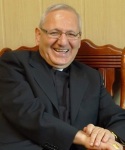 Louis Raphael I Cardinal Sako, Cardinal-Bishop, Patriach of Babylon (Chaldean), Iraq. The second Patriarch of Babylon to be made a cardinal, and also the second Iraqi prelate. 69-year-old Patriarch Sako was appointed to Babylon and the leadership of the Chaldean Church in 2013. Before that he was the Metropolitan Archbishop of Kirkuk. As an eastern Patriarch, Cardinal Sako will automatically be a cardinal-bishop, but as a member of a non-Roman Catholic Church, albeit one in union with Rome, he will not be given a title church.
Louis Raphael I Cardinal Sako, Cardinal-Bishop, Patriach of Babylon (Chaldean), Iraq. The second Patriarch of Babylon to be made a cardinal, and also the second Iraqi prelate. 69-year-old Patriarch Sako was appointed to Babylon and the leadership of the Chaldean Church in 2013. Before that he was the Metropolitan Archbishop of Kirkuk. As an eastern Patriarch, Cardinal Sako will automatically be a cardinal-bishop, but as a member of a non-Roman Catholic Church, albeit one in union with Rome, he will not be given a title church.
 Luis Francisco Cardinal Ferrer, Cardinal-Deacon, Prefect of the Congregation for the Doctrine of the Faith. Ever since the popes ceased to head the chief office in the curia themselves, its prefects have been made cardinals. 74-year-old Spanish Jesuit Ladaria Ferrer, formerly the second in command under Cardinal Müller, receives the red hat a year after being made prefect.
Luis Francisco Cardinal Ferrer, Cardinal-Deacon, Prefect of the Congregation for the Doctrine of the Faith. Ever since the popes ceased to head the chief office in the curia themselves, its prefects have been made cardinals. 74-year-old Spanish Jesuit Ladaria Ferrer, formerly the second in command under Cardinal Müller, receives the red hat a year after being made prefect.
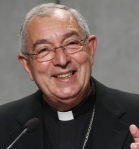 Angelo Cardinal de Donatis, Cardinal-Priest, Vicar General of Rome. Another almost automatic red hat, even under Pope Francis, goes to the vicar general for the vicariate of Rome. The 64-year-old is the second cardinal in the Roman archdiocese, joining Cardinal Angelo Comastri, the vicar general for Vatican City.
Angelo Cardinal de Donatis, Cardinal-Priest, Vicar General of Rome. Another almost automatic red hat, even under Pope Francis, goes to the vicar general for the vicariate of Rome. The 64-year-old is the second cardinal in the Roman archdiocese, joining Cardinal Angelo Comastri, the vicar general for Vatican City.
 Giovanni Angelo Cardinal Becciu, Cardinal-Deacon, Substitute of the Secretariat of State. All of Cardinal-elect Becciu’s predecessors have been made cardinals, but none while serving as subsistutes in the Secretariat of State. The general expectation is that the 69-year-old Italian will also leave that office soon: he may well suceed Cardinal Angelo Amato, who will turn 80 in June, at the head of the Congregation for the Causes of Saints.
Giovanni Angelo Cardinal Becciu, Cardinal-Deacon, Substitute of the Secretariat of State. All of Cardinal-elect Becciu’s predecessors have been made cardinals, but none while serving as subsistutes in the Secretariat of State. The general expectation is that the 69-year-old Italian will also leave that office soon: he may well suceed Cardinal Angelo Amato, who will turn 80 in June, at the head of the Congregation for the Causes of Saints.
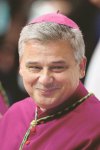 Konrad Cardinal Krajewski, Cardinal-Deacon, Almoner of the Office of Papal Charities. Without doubt the highest-regarded curial official in Francis’ Rome, the 54-year-old Polish almoner runs the charitable initiatives on behalf of the pope in Rome. Under his responsibility, showers and barber facilities for homeless have been installed in the colonnades of St. Peter’s Square, to name but one example. Cardinal-elect Krajewski is the first papal almoner to be made a cardinal.
Konrad Cardinal Krajewski, Cardinal-Deacon, Almoner of the Office of Papal Charities. Without doubt the highest-regarded curial official in Francis’ Rome, the 54-year-old Polish almoner runs the charitable initiatives on behalf of the pope in Rome. Under his responsibility, showers and barber facilities for homeless have been installed in the colonnades of St. Peter’s Square, to name but one example. Cardinal-elect Krajewski is the first papal almoner to be made a cardinal.
 Joseph Cardinal Coutts, Cardinal-Priest, Archbishop of Karachi, Pakistan. The second Pakistani cardinal, and the first native of that country to receive the red hat, ever. Cardinal-elect Coutts, 72, has been in the country’s southern metropolis since 2012, following stints in the dioceses of Hyderabad and Faisalabad. His election must be seen in the first place as a sign of support for the small Catholic presence in a largely Muslim country.
Joseph Cardinal Coutts, Cardinal-Priest, Archbishop of Karachi, Pakistan. The second Pakistani cardinal, and the first native of that country to receive the red hat, ever. Cardinal-elect Coutts, 72, has been in the country’s southern metropolis since 2012, following stints in the dioceses of Hyderabad and Faisalabad. His election must be seen in the first place as a sign of support for the small Catholic presence in a largely Muslim country.
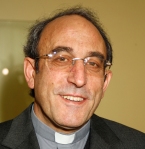 António Augusto Cardinal dos Santos Marto, Cardinal-Priest, Bishop of Leiria-Fátima, Portugal. It is not the first time that Francis creates a cardinal in a country he has previously visited. The bishop of the diocese which includes the major Marian shrine of Portugal and beyond hosted the pope in May of 2017. The 71-year cardinal-elect also serves as vice-president of the Portuguese bishops’ conference and becomes that country’s second cardinal.
António Augusto Cardinal dos Santos Marto, Cardinal-Priest, Bishop of Leiria-Fátima, Portugal. It is not the first time that Francis creates a cardinal in a country he has previously visited. The bishop of the diocese which includes the major Marian shrine of Portugal and beyond hosted the pope in May of 2017. The 71-year cardinal-elect also serves as vice-president of the Portuguese bishops’ conference and becomes that country’s second cardinal.
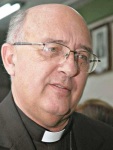 Pedro Ricardo Cardinal Barreto Jimeno, Cardinal-Priest, Archbishop of Huancayo, Peru. In January of this year, Pope Francis visited Peru, so that country also gets a cardinal. The 74-year-old archbishop of Huancayo joins the archbishop of the nation’s capital and is, like him, close to retirement. The cardinal-elect is the second Jesuit to be named in the current batch.
Pedro Ricardo Cardinal Barreto Jimeno, Cardinal-Priest, Archbishop of Huancayo, Peru. In January of this year, Pope Francis visited Peru, so that country also gets a cardinal. The 74-year-old archbishop of Huancayo joins the archbishop of the nation’s capital and is, like him, close to retirement. The cardinal-elect is the second Jesuit to be named in the current batch.
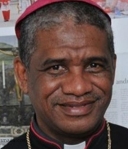 Désiré Cardinal Tsarahazana, Cardinal-Priest, Archbishop of Toamasina, Madagascar. After eight years, Madagascar gets a cardinal again, although he is not the archbishop of the capital, Antananarivo. Instead, tnhe 63-year-old cardinal-designate comes from the coastal see of Toamasina. He is the first archbishop of that see, after is was raised to that status in 2010, and he also serves as president of the Malagassy bishops’ conference.
Désiré Cardinal Tsarahazana, Cardinal-Priest, Archbishop of Toamasina, Madagascar. After eight years, Madagascar gets a cardinal again, although he is not the archbishop of the capital, Antananarivo. Instead, tnhe 63-year-old cardinal-designate comes from the coastal see of Toamasina. He is the first archbishop of that see, after is was raised to that status in 2010, and he also serves as president of the Malagassy bishops’ conference.

Giuseppe Cardinal Petrocchi, Cardinal-Priest, Archbishop of L’Aquila, Italy. In Italy’s mountaineous and earthquake-stricken region of L’Aquila since 2013, the 69-year-old cardinal-elect has been unavoidably involved with missions of charity and works of mercy. The first cardinal from that see, the appointment once more overlooks such ‘autmoatic’ cardinalatial sees like Venice, Turin and Milan.
 Thomas Aquino Manyo Cardinal Maeda, Cardinal-Priest, Archbishop of Osaka, Japan. Japan was long overdue for a cardinal, and this appointment as not as unique as may be expected. Previous Japanese cardinals came from Tokyo twice, but also one time each from Nagasaki and Osaka. The appointment of the 69-year-old archbishop, who has been in office since 2014, is once more a sign of support for a small Asian Catholic congregation.
Thomas Aquino Manyo Cardinal Maeda, Cardinal-Priest, Archbishop of Osaka, Japan. Japan was long overdue for a cardinal, and this appointment as not as unique as may be expected. Previous Japanese cardinals came from Tokyo twice, but also one time each from Nagasaki and Osaka. The appointment of the 69-year-old archbishop, who has been in office since 2014, is once more a sign of support for a small Asian Catholic congregation.
 Sergio Cardinal Obeso Rivera, Cardinal-Priest, Archbishop emeritus of Jalapa, Mexico. There’s always a Mexican among Francis’ appointments, it seems, but this time the choice has fallen on an archbishop who has retired since 2007. The 86-year-old’s election is one of honour, then, perhaps in part because of his two presidencies of the Mexican bishops’ conference.
Sergio Cardinal Obeso Rivera, Cardinal-Priest, Archbishop emeritus of Jalapa, Mexico. There’s always a Mexican among Francis’ appointments, it seems, but this time the choice has fallen on an archbishop who has retired since 2007. The 86-year-old’s election is one of honour, then, perhaps in part because of his two presidencies of the Mexican bishops’ conference.
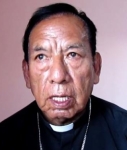 Toribio Cardinal Ticona Porco, Cardinal-Priest, Prelate emeritus of Corocoro, Bolivia. The 81-year-old retired prelate of a small mountain mining town could be said to have truly served on the fringes of the Catholic Church. The economy in the area has been stagnant since 1985, and the new cardinal has worked here for 20 years. He is the third Bolivian cardinal and the first not to come from one of the nation’s two capitals.
Toribio Cardinal Ticona Porco, Cardinal-Priest, Prelate emeritus of Corocoro, Bolivia. The 81-year-old retired prelate of a small mountain mining town could be said to have truly served on the fringes of the Catholic Church. The economy in the area has been stagnant since 1985, and the new cardinal has worked here for 20 years. He is the third Bolivian cardinal and the first not to come from one of the nation’s two capitals.
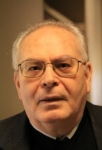 Aquilino Cardinal Bocos Merino, Cardinal-Deacon, Superior General emeritus of the Missionary Sons of the Immaculate Heart of Mary. Pope Francis places great value and emphasis on religious life, so in that sense it is odd that he names only three religious cardinals this time around. Perhaps he tries to balance that with the appointment of the 80-year-old Spanish Claretian who headed his order from 1991 to 2003. The order has produced four other cardinals, two of whom are still alive. It is f
Aquilino Cardinal Bocos Merino, Cardinal-Deacon, Superior General emeritus of the Missionary Sons of the Immaculate Heart of Mary. Pope Francis places great value and emphasis on religious life, so in that sense it is odd that he names only three religious cardinals this time around. Perhaps he tries to balance that with the appointment of the 80-year-old Spanish Claretian who headed his order from 1991 to 2003. The order has produced four other cardinals, two of whom are still alive. It is f
By the time of the consistory, Pope Francis will have created almost half of the electors, or active members of the College of Cardinals. He will have created 59 of them, while 47 will have been created by Pope emeritus Benedict XVI and a further 19 by Pope Saint John Paul II.
With the new consistory, Italy remains over-represented in the College, with 22 electors. It is followed by the United States with 10, Spain, France and Pland with 5, and Mexico, Brazil and India with 4 electors each. All other countries are represented by 2 or less cardinal electors.
Other changes
Before yesterdays’ announcement of the upcoming consistory, another change took place in the College of Cardinals, albeit an expected one. Ten years after being created, a cardinal-deacon can opt to be elevated to the next rank of cardinal-priest. This changes nothing in their hands, but only in their precedence among the other cardinals and thus their duties at a conclave to elect a new pope.
All six cardinal-deacons who were created by Pope Benedict XVI in 2007 accepted this change and became cardinal-priests, thus joining the other 11 surviving cardinal of their consistory, rising in precedence from after the most recently-created cardinal-priests of Pope Francis, to roughly the middle section of the cardinal-priests.
These six cardinals, who all kept their title churches pro hac vice (“for this time”, ie. for the duration of their being cardinals, which is usually until death) are:
- Leonardo Cardinal Sandri, Prefect of the Congregation for Oriental Churches and Grand Chancellor of the Pontifical Oriental Institute
- Paul Josef Cardinal Cordes, President emeritus of the Pontifical Council “Cor Unum”
- Angelo Cardinal Comastri, President of the Fabric of St. Peter, Archpriest of St. Peter’s Basilica and Vicar General for the Vatican City State
- Raffaele Cardinal Farina, Archivist emeritus of the Vatican Secret Archives, Librarian emeritus of the Vatican Apostolic Library and President emeritus of the Pontifical Commission for Reference on the Institute for Works of Religion
- Giovanni Cardinal Lajolo, President emeritus of the Pontifical Commission for the Vatican City State and President of the Governorate of the Vatican City State
- Stanislaw Cardinal Rylko, Archpriest of the Papal Basilica of St. Mary Major
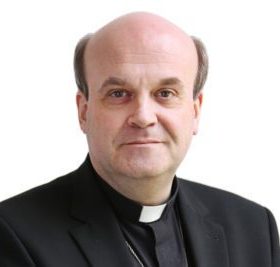 Bishop Hans van den Hende, chairman of the Dutch Bishops’ Conference and as such a participant in the meeting, decribes the context of his meetings with victims as follows:
Bishop Hans van den Hende, chairman of the Dutch Bishops’ Conference and as such a participant in the meeting, decribes the context of his meetings with victims as follows: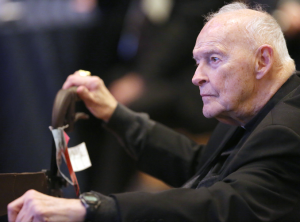 A fairly brief
A fairly brief 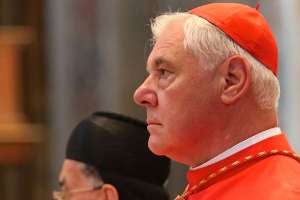 On Friday, Cardinal Gerhard Müller, former prefect of the Congregation for the Doctrine of the Faith and now a sort of free-roaming cardinal with no specific mission, issued a “
On Friday, Cardinal Gerhard Müller, former prefect of the Congregation for the Doctrine of the Faith and now a sort of free-roaming cardinal with no specific mission, issued a “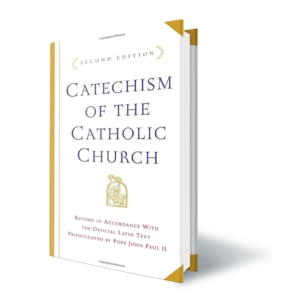 The manifesto is in the first place a summary of the
The manifesto is in the first place a summary of the  Early last week, Cardinal Müller was in the Netherlands to speak at a congress about recently canonised Pope Paul VI and Vatican II. Katholiek Nieuwsblad (which, as an aside, has recently been expanding its media work abroad, providing translated articles to
Early last week, Cardinal Müller was in the Netherlands to speak at a congress about recently canonised Pope Paul VI and Vatican II. Katholiek Nieuwsblad (which, as an aside, has recently been expanding its media work abroad, providing translated articles to 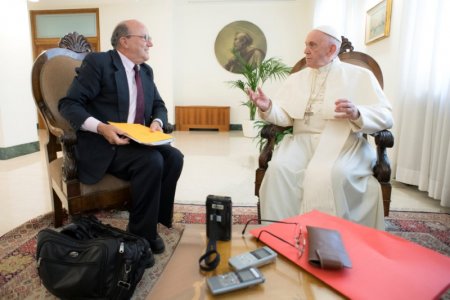 Pope Francis has again given an interview on the current affairs in his pontificate. It is good to see he chose a proper journalist this time: Reuters’ Philip Pullella. The interview is available
Pope Francis has again given an interview on the current affairs in his pontificate. It is good to see he chose a proper journalist this time: Reuters’ Philip Pullella. The interview is available 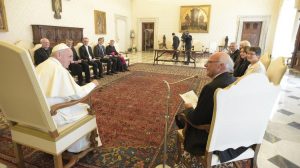 Words from Pope Francis, in
Words from Pope Francis, in 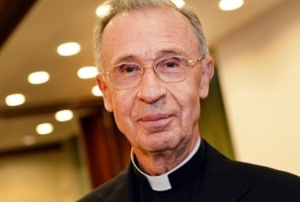 This quote is especially interesting as
This quote is especially interesting as 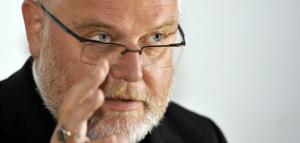 Cardinal Reinhard Marx, president of the German Bishops’ Conference and one of the supporters of the pastoral outreach,
Cardinal Reinhard Marx, president of the German Bishops’ Conference and one of the supporters of the pastoral outreach, 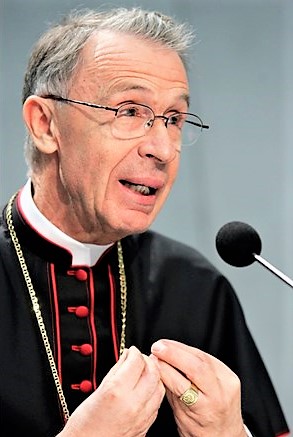 Archbishop Luis Ladaria Ferrer, soon to be a cardinal, took over the reins at the CDF after Cardinal Gerhard Müller was let go about a year ago. And since then, the Congregation published two major texts: Placuit Deo on Christian salvation, in February, and Oeconomicae et pecuniariae quaestiones on ethics in economy (published jointly with the Dicastery for Integral Human Development), in May. In comparison, that is the same number of documents released during the entire period that Cardinal Müller headed the CDF, from 2012 to 2017.
Archbishop Luis Ladaria Ferrer, soon to be a cardinal, took over the reins at the CDF after Cardinal Gerhard Müller was let go about a year ago. And since then, the Congregation published two major texts: Placuit Deo on Christian salvation, in February, and Oeconomicae et pecuniariae quaestiones on ethics in economy (published jointly with the Dicastery for Integral Human Development), in May. In comparison, that is the same number of documents released during the entire period that Cardinal Müller headed the CDF, from 2012 to 2017. Louis Raphael I Cardinal Sako, Cardinal-Bishop, Patriach of Babylon (Chaldean), Iraq. The second Patriarch of Babylon to be made a cardinal, and also the second Iraqi prelate. 69-year-old Patriarch Sako was appointed to Babylon and the leadership of the Chaldean Church in 2013. Before that he was the Metropolitan Archbishop of Kirkuk. As an eastern Patriarch, Cardinal Sako will automatically be a cardinal-bishop, but as a member of a non-Roman Catholic Church, albeit one in union with Rome, he will not be given a title church.
Louis Raphael I Cardinal Sako, Cardinal-Bishop, Patriach of Babylon (Chaldean), Iraq. The second Patriarch of Babylon to be made a cardinal, and also the second Iraqi prelate. 69-year-old Patriarch Sako was appointed to Babylon and the leadership of the Chaldean Church in 2013. Before that he was the Metropolitan Archbishop of Kirkuk. As an eastern Patriarch, Cardinal Sako will automatically be a cardinal-bishop, but as a member of a non-Roman Catholic Church, albeit one in union with Rome, he will not be given a title church. Luis Francisco Cardinal Ferrer, Cardinal-Deacon, Prefect of the Congregation for the Doctrine of the Faith. Ever since the popes ceased to head the chief office in the curia themselves, its prefects have been made cardinals. 74-year-old Spanish Jesuit Ladaria Ferrer, formerly the second in command under Cardinal Müller, receives the red hat a year after being made prefect.
Luis Francisco Cardinal Ferrer, Cardinal-Deacon, Prefect of the Congregation for the Doctrine of the Faith. Ever since the popes ceased to head the chief office in the curia themselves, its prefects have been made cardinals. 74-year-old Spanish Jesuit Ladaria Ferrer, formerly the second in command under Cardinal Müller, receives the red hat a year after being made prefect. Angelo Cardinal de Donatis, Cardinal-Priest, Vicar General of Rome. Another almost automatic red hat, even under Pope Francis, goes to the vicar general for the vicariate of Rome. The 64-year-old is the second cardinal in the Roman archdiocese, joining Cardinal Angelo Comastri, the vicar general for Vatican City.
Angelo Cardinal de Donatis, Cardinal-Priest, Vicar General of Rome. Another almost automatic red hat, even under Pope Francis, goes to the vicar general for the vicariate of Rome. The 64-year-old is the second cardinal in the Roman archdiocese, joining Cardinal Angelo Comastri, the vicar general for Vatican City. Giovanni Angelo Cardinal Becciu, Cardinal-Deacon, Substitute of the Secretariat of State. All of Cardinal-elect Becciu’s predecessors have been made cardinals, but none while serving as subsistutes in the Secretariat of State. The general expectation is that the 69-year-old Italian will also leave that office soon: he may well suceed Cardinal Angelo Amato, who will turn 80 in June, at the head of the Congregation for the Causes of Saints.
Giovanni Angelo Cardinal Becciu, Cardinal-Deacon, Substitute of the Secretariat of State. All of Cardinal-elect Becciu’s predecessors have been made cardinals, but none while serving as subsistutes in the Secretariat of State. The general expectation is that the 69-year-old Italian will also leave that office soon: he may well suceed Cardinal Angelo Amato, who will turn 80 in June, at the head of the Congregation for the Causes of Saints. Konrad Cardinal Krajewski, Cardinal-Deacon, Almoner of the Office of Papal Charities. Without doubt the highest-regarded curial official in Francis’ Rome, the 54-year-old Polish almoner runs the charitable initiatives on behalf of the pope in Rome. Under his responsibility, showers and barber facilities for homeless have been installed in the colonnades of St. Peter’s Square, to name but one example. Cardinal-elect Krajewski is the first papal almoner to be made a cardinal.
Konrad Cardinal Krajewski, Cardinal-Deacon, Almoner of the Office of Papal Charities. Without doubt the highest-regarded curial official in Francis’ Rome, the 54-year-old Polish almoner runs the charitable initiatives on behalf of the pope in Rome. Under his responsibility, showers and barber facilities for homeless have been installed in the colonnades of St. Peter’s Square, to name but one example. Cardinal-elect Krajewski is the first papal almoner to be made a cardinal. Joseph Cardinal Coutts, Cardinal-Priest, Archbishop of Karachi, Pakistan. The second Pakistani cardinal, and the first native of that country to receive the red hat, ever. Cardinal-elect Coutts, 72, has been in the country’s southern metropolis since 2012, following stints in the dioceses of Hyderabad and Faisalabad. His election must be seen in the first place as a sign of support for the small Catholic presence in a largely Muslim country.
Joseph Cardinal Coutts, Cardinal-Priest, Archbishop of Karachi, Pakistan. The second Pakistani cardinal, and the first native of that country to receive the red hat, ever. Cardinal-elect Coutts, 72, has been in the country’s southern metropolis since 2012, following stints in the dioceses of Hyderabad and Faisalabad. His election must be seen in the first place as a sign of support for the small Catholic presence in a largely Muslim country. António Augusto Cardinal dos Santos Marto, Cardinal-Priest, Bishop of Leiria-Fátima, Portugal. It is not the first time that Francis creates a cardinal in a country he has previously visited. The bishop of the diocese which includes the major Marian shrine of Portugal and beyond hosted the pope in May of 2017. The 71-year cardinal-elect also serves as vice-president of the Portuguese bishops’ conference and becomes that country’s second cardinal.
António Augusto Cardinal dos Santos Marto, Cardinal-Priest, Bishop of Leiria-Fátima, Portugal. It is not the first time that Francis creates a cardinal in a country he has previously visited. The bishop of the diocese which includes the major Marian shrine of Portugal and beyond hosted the pope in May of 2017. The 71-year cardinal-elect also serves as vice-president of the Portuguese bishops’ conference and becomes that country’s second cardinal. Pedro Ricardo Cardinal Barreto Jimeno, Cardinal-Priest, Archbishop of Huancayo, Peru. In January of this year, Pope Francis visited Peru, so that country also gets a cardinal. The 74-year-old archbishop of Huancayo joins the archbishop of the nation’s capital and is, like him, close to retirement. The cardinal-elect is the second Jesuit to be named in the current batch.
Pedro Ricardo Cardinal Barreto Jimeno, Cardinal-Priest, Archbishop of Huancayo, Peru. In January of this year, Pope Francis visited Peru, so that country also gets a cardinal. The 74-year-old archbishop of Huancayo joins the archbishop of the nation’s capital and is, like him, close to retirement. The cardinal-elect is the second Jesuit to be named in the current batch. Désiré Cardinal Tsarahazana, Cardinal-Priest, Archbishop of Toamasina, Madagascar. After eight years, Madagascar gets a cardinal again, although he is not the archbishop of the capital, Antananarivo. Instead, tnhe 63-year-old cardinal-designate comes from the coastal see of Toamasina. He is the first archbishop of that see, after is was raised to that status in 2010, and he also serves as president of the Malagassy bishops’ conference.
Désiré Cardinal Tsarahazana, Cardinal-Priest, Archbishop of Toamasina, Madagascar. After eight years, Madagascar gets a cardinal again, although he is not the archbishop of the capital, Antananarivo. Instead, tnhe 63-year-old cardinal-designate comes from the coastal see of Toamasina. He is the first archbishop of that see, after is was raised to that status in 2010, and he also serves as president of the Malagassy bishops’ conference.
 Thomas Aquino Manyo Cardinal Maeda, Cardinal-Priest, Archbishop of Osaka, Japan. Japan was long overdue for a cardinal, and this appointment as not as unique as may be expected. Previous Japanese cardinals came from Tokyo twice, but also one time each from Nagasaki and Osaka. The appointment of the 69-year-old archbishop, who has been in office since 2014, is once more a sign of support for a small Asian Catholic congregation.
Thomas Aquino Manyo Cardinal Maeda, Cardinal-Priest, Archbishop of Osaka, Japan. Japan was long overdue for a cardinal, and this appointment as not as unique as may be expected. Previous Japanese cardinals came from Tokyo twice, but also one time each from Nagasaki and Osaka. The appointment of the 69-year-old archbishop, who has been in office since 2014, is once more a sign of support for a small Asian Catholic congregation. Sergio Cardinal Obeso Rivera, Cardinal-Priest, Archbishop emeritus of Jalapa, Mexico. There’s always a Mexican among Francis’ appointments, it seems, but this time the choice has fallen on an archbishop who has retired since 2007. The 86-year-old’s election is one of honour, then, perhaps in part because of his two presidencies of the Mexican bishops’ conference.
Sergio Cardinal Obeso Rivera, Cardinal-Priest, Archbishop emeritus of Jalapa, Mexico. There’s always a Mexican among Francis’ appointments, it seems, but this time the choice has fallen on an archbishop who has retired since 2007. The 86-year-old’s election is one of honour, then, perhaps in part because of his two presidencies of the Mexican bishops’ conference. Toribio Cardinal Ticona Porco, Cardinal-Priest, Prelate emeritus of Corocoro, Bolivia. The 81-year-old retired prelate of a small mountain mining town could be said to have truly served on the fringes of the Catholic Church. The economy in the area has been stagnant since 1985, and the new cardinal has worked here for 20 years. He is the third Bolivian cardinal and the first not to come from one of the nation’s two capitals.
Toribio Cardinal Ticona Porco, Cardinal-Priest, Prelate emeritus of Corocoro, Bolivia. The 81-year-old retired prelate of a small mountain mining town could be said to have truly served on the fringes of the Catholic Church. The economy in the area has been stagnant since 1985, and the new cardinal has worked here for 20 years. He is the third Bolivian cardinal and the first not to come from one of the nation’s two capitals. Aquilino Cardinal Bocos Merino, Cardinal-Deacon, Superior General emeritus of the Missionary Sons of the Immaculate Heart of Mary. Pope Francis places great value and emphasis on religious life, so in that sense it is odd that he names only three religious cardinals this time around. Perhaps he tries to balance that with the appointment of the 80-year-old Spanish Claretian who headed his order from 1991 to 2003. The order has produced four other cardinals, two of whom are still alive. It is f
Aquilino Cardinal Bocos Merino, Cardinal-Deacon, Superior General emeritus of the Missionary Sons of the Immaculate Heart of Mary. Pope Francis places great value and emphasis on religious life, so in that sense it is odd that he names only three religious cardinals this time around. Perhaps he tries to balance that with the appointment of the 80-year-old Spanish Claretian who headed his order from 1991 to 2003. The order has produced four other cardinals, two of whom are still alive. It is f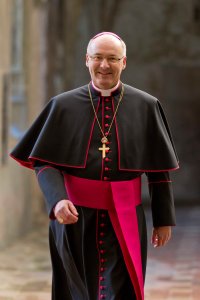
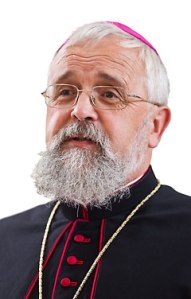 Opposing the actions of the seven bishops is Bishop Gerhard Feige, bishop of Magdeburg and president of the ecumenism commission of the German Bishops’ Conference. In a contribution to Der Zeit last Thursday, Msgr. Feige stated that not taking the chance to help people deepen the joy of the faith and their participation in the Eucharist, as well as promoting ecumenical encounters and strengthening the marriage bond would be “macabre and shameful”. Contrary to other bishops, Msgr. Feige insists that the pastoral outreach exists within modern theological and legal possibilities, referring to the canon law paragraphs which allow local bishops to decide under which circumstances non-Catholic can receive Communion. These circumstances, however, are emergency situations in which the danger of death and the unavailability of ministers of a person’s own denomination play key roles.
Opposing the actions of the seven bishops is Bishop Gerhard Feige, bishop of Magdeburg and president of the ecumenism commission of the German Bishops’ Conference. In a contribution to Der Zeit last Thursday, Msgr. Feige stated that not taking the chance to help people deepen the joy of the faith and their participation in the Eucharist, as well as promoting ecumenical encounters and strengthening the marriage bond would be “macabre and shameful”. Contrary to other bishops, Msgr. Feige insists that the pastoral outreach exists within modern theological and legal possibilities, referring to the canon law paragraphs which allow local bishops to decide under which circumstances non-Catholic can receive Communion. These circumstances, however, are emergency situations in which the danger of death and the unavailability of ministers of a person’s own denomination play key roles.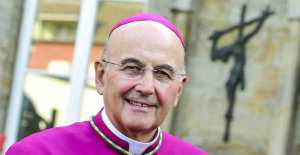 Münster’s Bishop Felix Genn is hopeful of finding a consensus. While the way in which the seven bishops expressed their difficulties with the conference’s vote did not make him happy, he understands their questions of conscience. In an interview for WDR radio Bishop Genn expressed his happiness about the way in which the standing council of the bishops’ conference discussed the issue last week. And although he would have preferred that the seven bishops had first informed the others about their letter before sending it, Bishop Genn’s attitude is perhaps the most consensus-minded in the delegation, which may be a reason for his inclusion. The bishop, for his part, simply thought of his mother’s motto when hearing about being included in the delegation: “One has never got enough work to do.”
Münster’s Bishop Felix Genn is hopeful of finding a consensus. While the way in which the seven bishops expressed their difficulties with the conference’s vote did not make him happy, he understands their questions of conscience. In an interview for WDR radio Bishop Genn expressed his happiness about the way in which the standing council of the bishops’ conference discussed the issue last week. And although he would have preferred that the seven bishops had first informed the others about their letter before sending it, Bishop Genn’s attitude is perhaps the most consensus-minded in the delegation, which may be a reason for his inclusion. The bishop, for his part, simply thought of his mother’s motto when hearing about being included in the delegation: “One has never got enough work to do.” While the letter by Cardinal Woelki, Archbishop Schick and Bishops Zdarsa, Hanke, Ipolt, Voderholzer and Oster received much attention in the media, the signatories themselves treated it as a normal matter of correspondence. Cardinal Woelki, who was visiting Ukraine when the news broke, expressed his surprise at the hype and the talk about dissent. Presenting the questions about intercommunion to Rome was not so much a matter of going against his fellow bishops, but rather came from the importance of the matter: “With several bishops, we were convinced that it would be good to universally coordinate the solution that we have discussed and established here, with an eye on the unity of the Church and the common ground with the other particular churches.” Cardinal Woelki is not so much opposed to the proposals from the conference, to allow non-Catholic spouses of Catholics to receive Communion with their partner on a case-by-case basis, but does not think it is a decision that should be made by the German bishops alone.
While the letter by Cardinal Woelki, Archbishop Schick and Bishops Zdarsa, Hanke, Ipolt, Voderholzer and Oster received much attention in the media, the signatories themselves treated it as a normal matter of correspondence. Cardinal Woelki, who was visiting Ukraine when the news broke, expressed his surprise at the hype and the talk about dissent. Presenting the questions about intercommunion to Rome was not so much a matter of going against his fellow bishops, but rather came from the importance of the matter: “With several bishops, we were convinced that it would be good to universally coordinate the solution that we have discussed and established here, with an eye on the unity of the Church and the common ground with the other particular churches.” Cardinal Woelki is not so much opposed to the proposals from the conference, to allow non-Catholic spouses of Catholics to receive Communion with their partner on a case-by-case basis, but does not think it is a decision that should be made by the German bishops alone.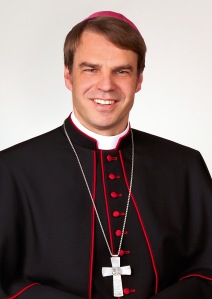 The most extensive explanation for signing the letter comes from Bishop Stefan Oster of Passau. In an article published in the diocesan magazine and
The most extensive explanation for signing the letter comes from Bishop Stefan Oster of Passau. In an article published in the diocesan magazine and 